 Petzlover
Petzlover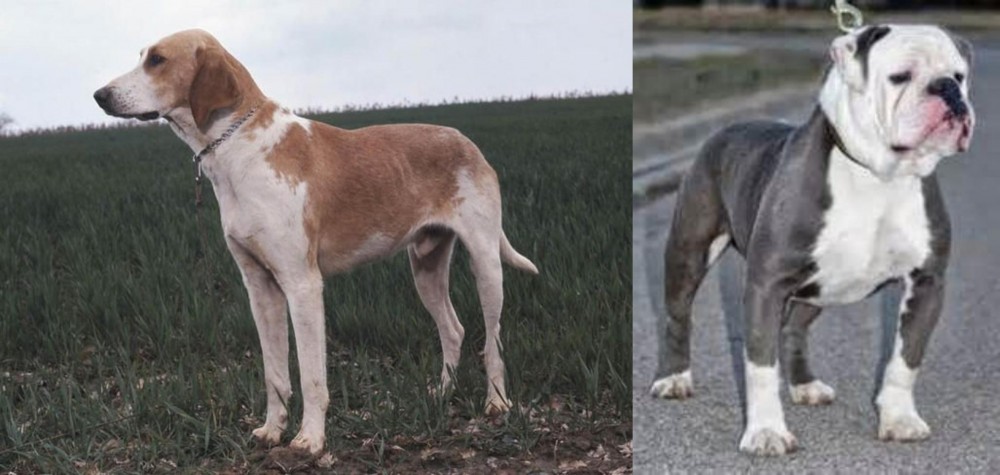 Grand Anglo-Francais Blanc et Orange is originated from France but Old English Bulldog is originated from United Kingdom. Grand Anglo-Francais Blanc et Orange may grow 30 cm / 12 inches higher than Old English Bulldog. Grand Anglo-Francais Blanc et Orange may weigh 14 kg / 31 pounds more than Old English Bulldog. Both Grand Anglo-Francais Blanc et Orange and Old English Bulldog has almost same life span. Both Grand Anglo-Francais Blanc et Orange and Old English Bulldog has almost same litter size. Both Grand Anglo-Francais Blanc et Orange and Old English Bulldog requires Low Maintenance.
Grand Anglo-Francais Blanc et Orange is originated from France but Old English Bulldog is originated from United Kingdom. Grand Anglo-Francais Blanc et Orange may grow 30 cm / 12 inches higher than Old English Bulldog. Grand Anglo-Francais Blanc et Orange may weigh 14 kg / 31 pounds more than Old English Bulldog. Both Grand Anglo-Francais Blanc et Orange and Old English Bulldog has almost same life span. Both Grand Anglo-Francais Blanc et Orange and Old English Bulldog has almost same litter size. Both Grand Anglo-Francais Blanc et Orange and Old English Bulldog requires Low Maintenance.
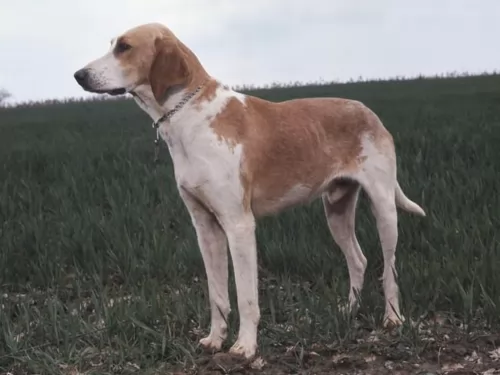 The Grand Anglo-Français Blanc et Orange is one of three Grand Anglo-Français breeds. The dogs comes from crossing French scenting hounds with English Foxhounds way back in the 19th century.
The Grand Anglo-Français Blanc et Orange is one of three Grand Anglo-Français breeds. The dogs comes from crossing French scenting hounds with English Foxhounds way back in the 19th century.
The sporting dog is rare, believing to be be pretty much confined to their country of origin – France. It is recognized in France by the French Kennel Club and also internationally by the Federation Cynologique Internationale. Since 2006, they have been recognized by the UKC and are thought to be kept essentially as a working dog as opposed to being kept as a companion dog.
 This is an extinct dog breed. It is believed that the dog came from ancient dogs such as the old Mastiff. The Old English Bulldog was the original English Bulldog but quite different from the modern variety, with longer legs as well as a longer muzzle and more aggressive.
This is an extinct dog breed. It is believed that the dog came from ancient dogs such as the old Mastiff. The Old English Bulldog was the original English Bulldog but quite different from the modern variety, with longer legs as well as a longer muzzle and more aggressive.
It is believed that the Old English Bulldog was the ancestor to many breeds and there have been efforts to recreate the Old English Bulldog, bringing about quite a few new Bulldog breeds. Records are actually unclear as to its origins and when you read up on its ancestry, you see that a lot of the information is conflicting.
A number of breeders have attempted to recreate this extinct breed with some success, but it must be borne in mind that these recreations aren’t the Old English Bulldog, as the genetics of it are extinct.
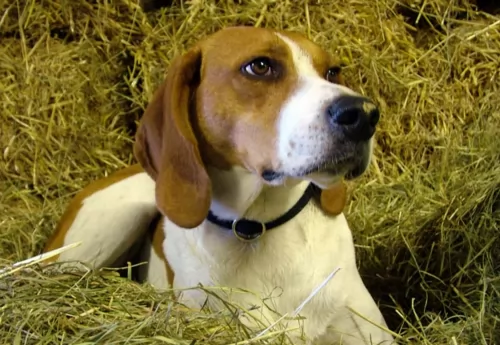 The lean, muscular Grand Anglo-Français Blanc et Orange is a large, powerful dog standing at 60 – 70cm at the withers and weighing 30 to 36 kg.
The lean, muscular Grand Anglo-Français Blanc et Orange is a large, powerful dog standing at 60 – 70cm at the withers and weighing 30 to 36 kg.
He has a short, broad head with a broad, flat skull. He has long legs, a long tail and long, floppy ears. His coat is white with orange markings. These dogs are instinctive hunters with a superb sense of smell and the ability to track their prey for miles.
Sociable, independent, loving and loyal, the Grand Anglo-Français Blanc et Orange can become attached to his owner. He doesn't want to be left alone for long periods of time, becoming bored and destructive.
Training and socialization is excellent for your dog, making him obedient and also more relaxed when you're not there.While he is patient and good with children, if you're looking for a playful pet, this dog wouldn't come as recommended for children, as his heart longs to just be outside on the hunt.
 This dog is extinct but he used to be a fairly broadly set, muscular dog, taller than the bulldog of today.
This dog is extinct but he used to be a fairly broadly set, muscular dog, taller than the bulldog of today.
The average height of this dog was 36 – 40cm, weighing in at about 18 to 22kg. One of the dog’s more noticeable characteristics was his lower jaw that projected quite a bit in front of the upper jaw. The dog was deep-chested, the head broad and the nose and muzzle short.
The breed was developed for bull baiting, but in England, with the adoption of the Act of cruelty to animals, there was a decline in the interest for the dog, leading to it becoming extinct. There are old paintings from the 1800s and one such painting, Crib and Rosa, gives an idea of the form and size of the Old English Bulldog.
The regular English Bulldog today is often confused with the Old English Bulldog but it is a far sweeter breed than the Old English Bulldog. It is believed that the Old English Bulldog was an aggressive dog, bred to be this way because of his role in bull baiting.
As a pet though, brought up as a companion, he no doubt would have made a loving, loyal pet.
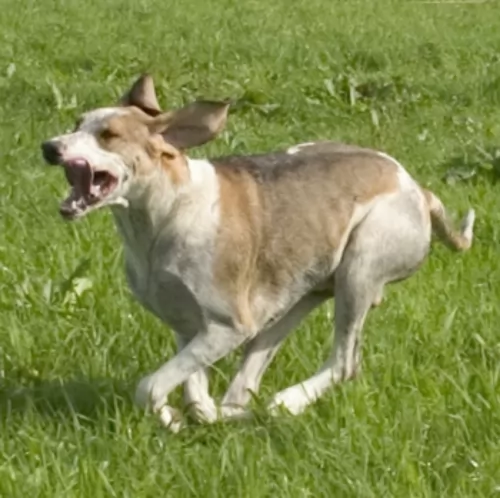 The Grand Anglo – Francais et Orange has always been a pack dog and used to being social. He will get on well with his entire human family as well as with any other pets in the home.
The Grand Anglo – Francais et Orange has always been a pack dog and used to being social. He will get on well with his entire human family as well as with any other pets in the home.
The Grand Anglo-Francais Blanc et Orange is a loyal dog, and when trained he becomes an excellent companion. He is patient with children, but doesn't make a particularly great playmate as he has a more serious personality.
The Grand Anglo-Francais Blanc et Orange is a dog that has been specifically developed to hunt, so ensure that he gets a good amount of exercise. While he is essentially a dog that loves working in a pack, he can still make his human family a loving and devoted pet.
 Not much information is available on this extinct dog. Perhaps because of his history of being used for bull baiting, he wouldn’t have made a good family pet as he was too aggressive. He wouldn't have been a good choice for a first time dog owner and he wouldn't have been a good choice of pet for children.
Not much information is available on this extinct dog. Perhaps because of his history of being used for bull baiting, he wouldn’t have made a good family pet as he was too aggressive. He wouldn't have been a good choice for a first time dog owner and he wouldn't have been a good choice of pet for children.
He was possibly owned by a single person who made money from him. Small wonder then that he became extinct when he was no longer required for this role.
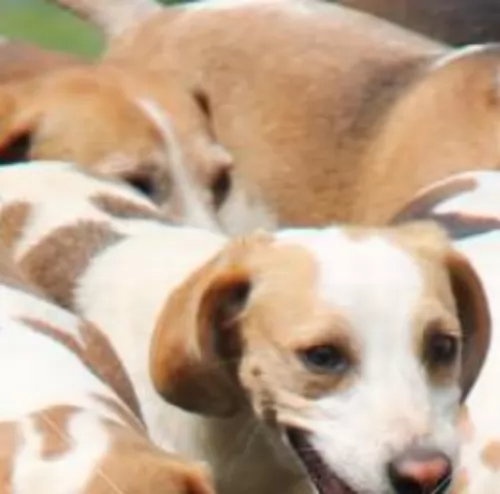 Capable of reaching 10 to 12 years in age, you won't really find any particular health issues with this dog. He is a fairly healthy dog and will be able to reach a good age with good nutrition, exercise, love and care.
Capable of reaching 10 to 12 years in age, you won't really find any particular health issues with this dog. He is a fairly healthy dog and will be able to reach a good age with good nutrition, exercise, love and care.
Because of the long, floppy ears, you want to be checking inside the ears. As a hunting scentdog, he will chase his prey through water if needs be, and damp ears can encourage bacteria.
Ear infections are common in most dogs, and you'll notice your pet scratching and rubbing at his ear and even shaking his head. You may also notice swelling or redness. Veterinary intervention will be necessary.
If your dog's ear infection has cleared up, you can maintain the health of the ear by cleaning them with a gentle cleanser and cotton wool. There is always caution when cleaning a dog’s ear, and rupturing the ear drum is one. Be careful, and if you're not sure, rather make an appointment with your vet to have his ears cleaned.
 This dog, although extinct would have battled with common dog illnesses that can still be seen in the modern bulldog today.
This dog, although extinct would have battled with common dog illnesses that can still be seen in the modern bulldog today.
Brachycephalic airway syndrome is all about upper airway abnormalities and can be quite a problem in your Old English Bulldog because of the shortened muzzle of these breeds. These particular dogs have a smaller upper jaw and an overcrowding of of teeth and you will see that effort is required to inhale. They breathe more easily through the mouth then the nose. They have noisy breathing, particularly during exercise and in hot weather.
Dogs have 3 eyelids, and cherry eye is the term used for prolapsed nictitating membrane, or the 3rd eyelid, when the eyelid comes out of place and you get a pink mass. It is a common condition found in Bulldogs, a genetic problem where surgical intervention or medicine may be recommended.
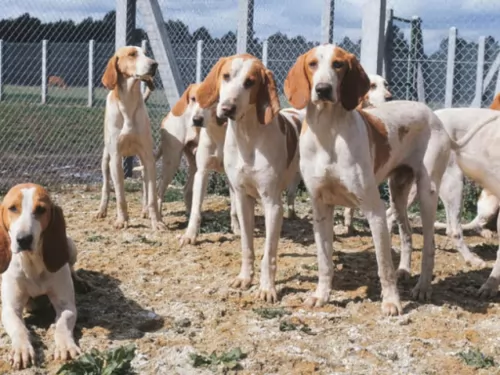 As a scenthound, your Grand Anglo-Français Blanc et Orange loves being outdoors and following a scent trail. These dogs therefore are better suited to life in the countryside as opposed to life in the city. Make sure you provide him with plenty of exercise – walks, swimming and running with you when you go cycling or jogging. Include ball- and rope games too.
As a scenthound, your Grand Anglo-Français Blanc et Orange loves being outdoors and following a scent trail. These dogs therefore are better suited to life in the countryside as opposed to life in the city. Make sure you provide him with plenty of exercise – walks, swimming and running with you when you go cycling or jogging. Include ball- and rope games too.
Your orange and white scent dog will thrive on you taking time out for him to brush his short coat twice a week and to also check for fleas and ticks at the same time.
Looking forward to his food, your energetic Grand Anglo-Français Blanc et Orange will require a high quality commercially manufactured food. Make sure that you buy the best brands to ensure your pet gets his vitamins and minerals in instead of just a lot of fillers, colorants and preservatives.
Many dog owners prefer giving their dogs several smaller meals throughout the day as opposed to one or two large meals. With his dry kibble you can add in some raw meat from time to time as well as cooked brown rice, cooked chicken and vegetables. See that he has access to a constant supply of fresh, cool water.
 If the Old English Bulldog were still around today, you would have cared for him like you would most other dogs -
If the Old English Bulldog were still around today, you would have cared for him like you would most other dogs -
Feed your Old English Bulldog puppy 4 times a day with high quality puppy food.
At 6 months of age you can be giving your young dog 2 meals a day.
Commercially manufactured food is fine if its a high quality one. Always check out the top 5 ingredients on the packaging – the first 2 should be protein or meat. Follow a simple, consistent diet to minimize symptoms. Your adult dog can have kibble and sometimes you can add in chopped boiled chicken, brown rice and vegetables such as sweet potatoes, carrots and spinach. A little bit of raw meat can also be added to the kibble once in a while. Never leave your dog without a constant supply of fresh, cool water.
Even though the dog is extinct, dog owners of that time would have had to watch their dogs for ticks and fleas and any of the common dog illnesses of that time.
The dog would have had some kind of grooming – a brush down a couple of times and he would have been checked for ear and eye infections.